Course Information

CONTACT US
We look forward to having you on course with us soon! If you have questions about the application process, submitting forms, or anything else, you may contact your student services representative directly, call the Student Services General Line, (828)-239-2376 or email us at, student.services@vobs.org.
WELCOME TO YOUR JOURNEY
Click on the tabs below to find your packing list, travel information, and much more.
Under each tab you'll find a list of topics. Click on these topics to expand the information.
Boundary Waters Dog Sledding & Cross Country Skiing for Adults- 8-Day
Course Number
VMAD-2621
Date
January 17, 2026 - January 24, 2026
Your full tuition payment is due by the deadline in your applicant portal. Please make your payment by that deadline.
We hope you look forward to your Outward Bound course! Now let us help you protect your investment. We partner with InsureMyTrip to offer our students a travel insurance option that will help protect your course from several different disruptions. Together Outward Bound and InsureMyTrip will be here for you before, during, and after your trip. We strongly recommend that you purchase trip insurance to protect your investment in your course. Voyageur Outward Bound School tuition is non-refundable.
You may choose to purchase trip related insurance through InsureMyTrip or a different insurance provider. In either case, the amount and type of coverage you choose is your responsibility and must be discussed directly with the provider.
CLICK HERE TO RECEIVE A FREE QUOTE FROM INSURE MY TRIP
You can find additional information about InsureMyTrip in the cancellation policies.
In addition to the expedition itself and all of the skills and learning associated with it, Outward Bound’s time-tested curriculum includes education on the many aspects of personal growth and learning that can be found in each activity you undertake. You will learn four important Outward Bound Core Values:
- Compassion
- Integrity
- Excellence
- Inclusion and Diversity
You may find that the most important lessons you take home are learning about yourself and your community while acquiring backcountry skills and having an adventure.You’ll learn to protect and appreciate the unique, unspoiled environments through which you travel.
Successful completion of your course demands mastery of skills, trust, fitness, confidence, tenacity, leadership, initiative and compassion. The promotion of these qualities and the discovery of what’s in you is the purpose of Outward Bound.
Boundary Waters Canoe Area Wilderness (BWCAW)
Over 10,000 years ago, continental-sized glaciers scraped their way across much of Ontario and northern Minnesota leaving deep ruts, ravines, and holes in their tracks. Eventually, as the glaciers melted, these ravines filled with water, creating a seemingly endless interconnected web of lakes and rivers.
In 1978, the United States designated over 1-million acres of this Northern Minnesota landscape as a protected wilderness area called the Boundary Waters Canoe Area Wilderness (BWCAW). Because no roads, power lines, or motorized craft may enter its borders, the BWCAW has remained relatively unchanged since the glaciers receded. The BWCAW extends nearly 150 miles along the Canadian border and encompasses more than 1,000 lakes and rivers. Over 1,200 miles of navigable routes lead to over 2,200 campsites and provide an unparalleled opportunity to travel by canoe and dogsled.
In the winter, the BWCAW transforms into an even more severe and remote wilderness. While more difficult, winter enthusiasts’ travel over frozen lakes and rivers by dogsled, cross-country ski and snowshoe. Winter in the Boundary Waters is mesmerizing, peaceful, and exhilarating. It is a place of spectacular extremes, trackless snow, bracing cold air, glowing warm embers, and powerful silence.
Homeplace, Voyageur Outward Bound School Basecamp, Minnesota
Homeplace is located at the edge of the Boundary Waters Canoe Area Wilderness in northern Minnesota. Situated where the Kawishiwi River meets Birch Lake in the Superior National Forest, the Voyageur Outward Bound School basecamp provides an ideal location for launching/ending BWCAW paddling and dogsledding trips, and practicing white water paddling skills. The surrounding boreal forest also makes Homeplace a great location for spotting moose, wolves, beavers, deer, woodpeckers, eagles and black bear.
Dogsledding and Skiing - The small town of Ely, Minnesota, where the Voyageur Outward Bound School is located, is known as the dogsledding capitol of the lower 48 states for good reason. The Boundary Waters Canoe Area Wilderness, one of the most historically significant and remote wilderness areas in North America, is located just outside Ely’s back door and as temperatures drop, winter transforms these historic canoe routes into beautiful, snow-covered environments ideal for winter travel. During a Voyageur Outward Bound School Dogsledding and Skiing expedition, students travel over frozen lakes and rivers while learning how to manage teams of huskies, cross-country ski, navigate with a map and compass, check ice-conditions, process firewood, and generally stay comfortable in potentially sub-zero temperatures. The group usually consists of 9 people, 7 students and 2 Instructors, and splits into two smaller groups each day. Half the group travels on cross-country skis and is responsible for breaking trail, navigating, scouting for hazards, and checking for safe ice conditions. The other half of the group follows on dogsleds, transporting most of the equipment, and food. Mushing is not a passenger sport and, depending on the snow conditions, often requires mushers to push the sled or run and walk along with the dogs. If the skiing group encounters particularly rough terrain or steep hills, they wait for the mushers to arrive and help maneuver the heavy dogsleds. Groups travel during the day and look for an appropriate camping spot each evening.
Winter Camping - Winter weather in Minnesota varies dramatically from harsh, cold wind to bright, less-cold sunshine, but in general it’s always cold. Temperatures range from -40 to 20 degrees in the heart of the winter (December through February) and -20 to 50 degrees as spring approaches in March. Living outside during a northern winter requires the right equipment, skills, and teamwork, but it can be done comfortably. Instructors teach students how to mitigate cold weather risks, dress appropriately, and manage body temperature with food and exercise.
In order to minimize environmental impact, groups cook and sleep directly on frozen lakes. For this reason, groups always look for a sheltered bay out of the wind each evening. Upon reaching camp, groups divide camp chores to set up camp efficiently. Students learn to take care of sled dogs, set up sleeping shelters, cook meals over a fire, and saw and split firewood. If the weather is particularly cold or wet groups might setup the wall-tent, a large canvas tent with a woodstove. The wall-tent gets very warm and is large enough to fit the entire group inside.
Solo – Weather and time permitting, an Outward Bound Solo experience provides an important break from the rigors of the expedition and gives students the opportunity to reflect on their Outward Bound experience. The duration of Solo depends on the course length and type as well as the competency and preparedness of the student group. Students on a 3-week course typically spend 2-nights on Solo while students on a 1-week course may spend one night or even just a few hours on Solo. Regardless of Solo length, all students receive sufficient food, water, and shelter to keep them safe and healthy during Solo. Instructors choose Solo sites to offer as much solitude as possible while retaining some proximity to the whole group. While students spend the majority of their Solo time alone, Instructors do check on each student as often as needed, usually 1-4 times per day, to ensure that each student feels safe and comfortable. Instructors work with each student individually to structure a successful, unique Solo experience that meets their specific needs. Solo is purposefully scheduled near the end of the expedition so students have plenty of time to acclimate to their new environments beforehand.
Students often have mixed feelings leading up to Solo. Inevitably, students feel some nervousness and hesitation but are also excited to rest, reflect and test their new skills after spending many days in the wilderness. Students often find that Solo provokes profound and powerful learning in a short period of time and Solo often becomes one of the most memorable parts of their Outward Bound experience.
Final Expedition – Outward Bound believes that an appropriate amount of independence is a powerful educational tool. In order to deliver that benefit, Outward Bound purposefully and gradually transfers certain leadership responsibilities to the students culminating with our “Final Expedition.” Near the end of course, if you and your group have demonstrated the necessary leadership, team problem-solving and wilderness living skills, you may be given the opportunity to travel without your instructors immediately present. Students on courses designed for ages 16 and older may travel without instructors immediately present (although they will be near the group for safety reasons) for one to five days depending on course length, student age, staff assessment of students’ abilities, and terrain. Many of our students feel this phase of the course is the most rewarding as the group learns to work together, problem solve, and accomplish a goal independently while utilizing all the skills they have acquired.
Course End – All courses end with a shower, graduation ceremony, and celebration dinner. Shower facilities are available at the basecamp.
The following is an example of what your course itinerary may look like. Your actual itinerary will vary according to weather, student skills and abilities, and instructor preferences.
Day 1: The course begins at the Duluth Airport before transporting to the Voyageur Outward Bound School basecamp near Ely, MN. Meet your Outward Bound Instructors, organize your equipment, eat dinner, earn about cold injuries and how to prevent them, and sleep outside on the very first night of the course.
Day 2-4: Participate in cross-country skiing and dogsledding lessons. Pack the dogsleds, depart from basecamp and enter the Boundary Waters Canoe Area Wilderness. Travel until it’s time to set up camp for the night. Travel during the day and camp in the evenings. Half the group travels by ski and half by dogsled, switching from day to day. Learn to ski, dogsled, care for huskies, check ice conditions, navigate with a map and compass, process firewood, and stay warm in sub-zero temperatures.
Day 5: Spend the morning preparing for Solo - head out on solo in the afternoon. Test new skills by building a fire, cooking a hot meal, and constructing a sleeping shelter. Spend the night alone in your own quiet section of shoreline.
Day 6: Execute the final phase of the expedition with less guidance from your Outward Bound Instructors.
Day 7: Return to the basecamp and clean equipment before taking a sauna and polar plunge in the frozen river (through a hole cut in the ice). Take a hot shower, eat a celebratory dinner, and participate in an Outward Bound graduation ceremony before falling asleep in a wood-stove heated cabin.
Day 8: Eat an early indoor breakfast before departing for the airport and traveling home.
Minnesota’s weather can be unpredictable with a wide range of temperatures. Between December and March Minnesota temperatures can range from -40 to 40 degrees Fahrenheit, but -20 to 20 degree nights and days are the most common. Days are typically very sunny with bright blue skies. Wind and snow are common.
Weather is always a factor when traveling in the wilderness and it adds an exciting element of challenge to each course. Learning to handle varying weather conditions is essential to a successful wilderness course.
Please utilize the resources below to physically and mentally prepare for your course. The more preparation you do, the better your experience will be!
Winter Course Life - A Student's Perspective
Camp & Shelter Set-Up for Winter Courses
After traveling across frozen lakes and portages, you'll arrive at your campsite for the night. Your group will work together, spending 2-3 hours setting up camp and caring for dogs. Your group will gather a significant amount of firewood for cooking, heating & boiling water, and drying out gear.
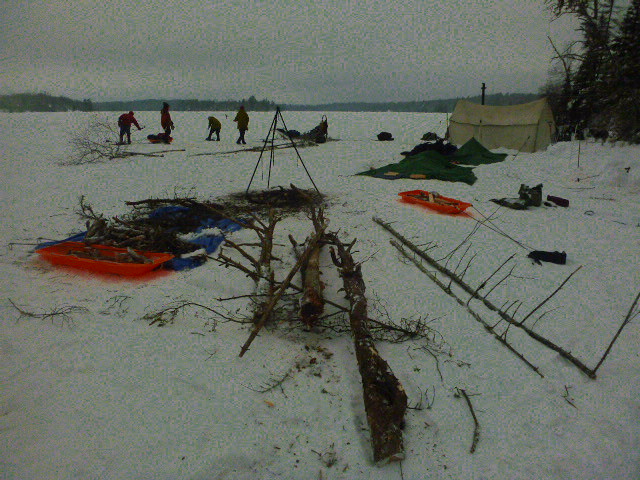
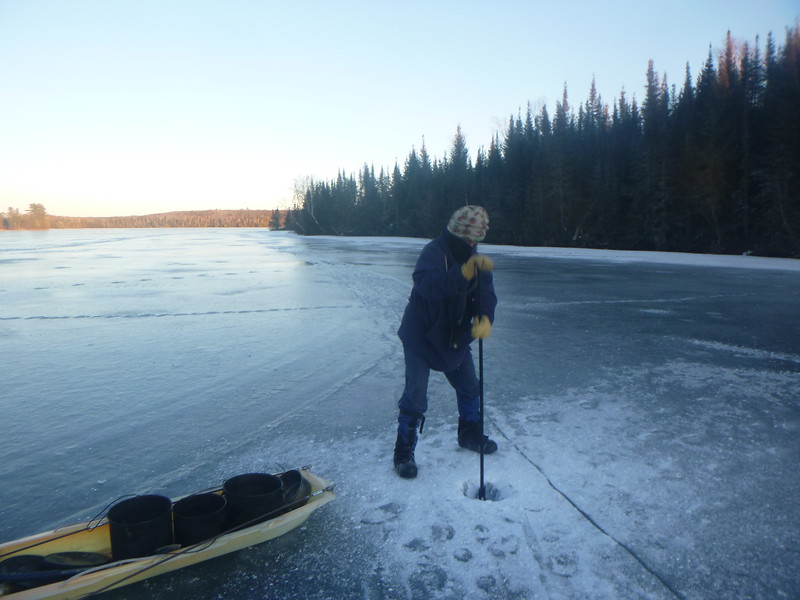
Setting up camp also involves sleddog care, chopping a hole in the ice for water, putting up sleeping tarps, and setting up your evening cooking & eating area. Your group may build a campfire on the ice or you may set up the wall tent. The wall tent is used solely for cooking food & drying your gear.
.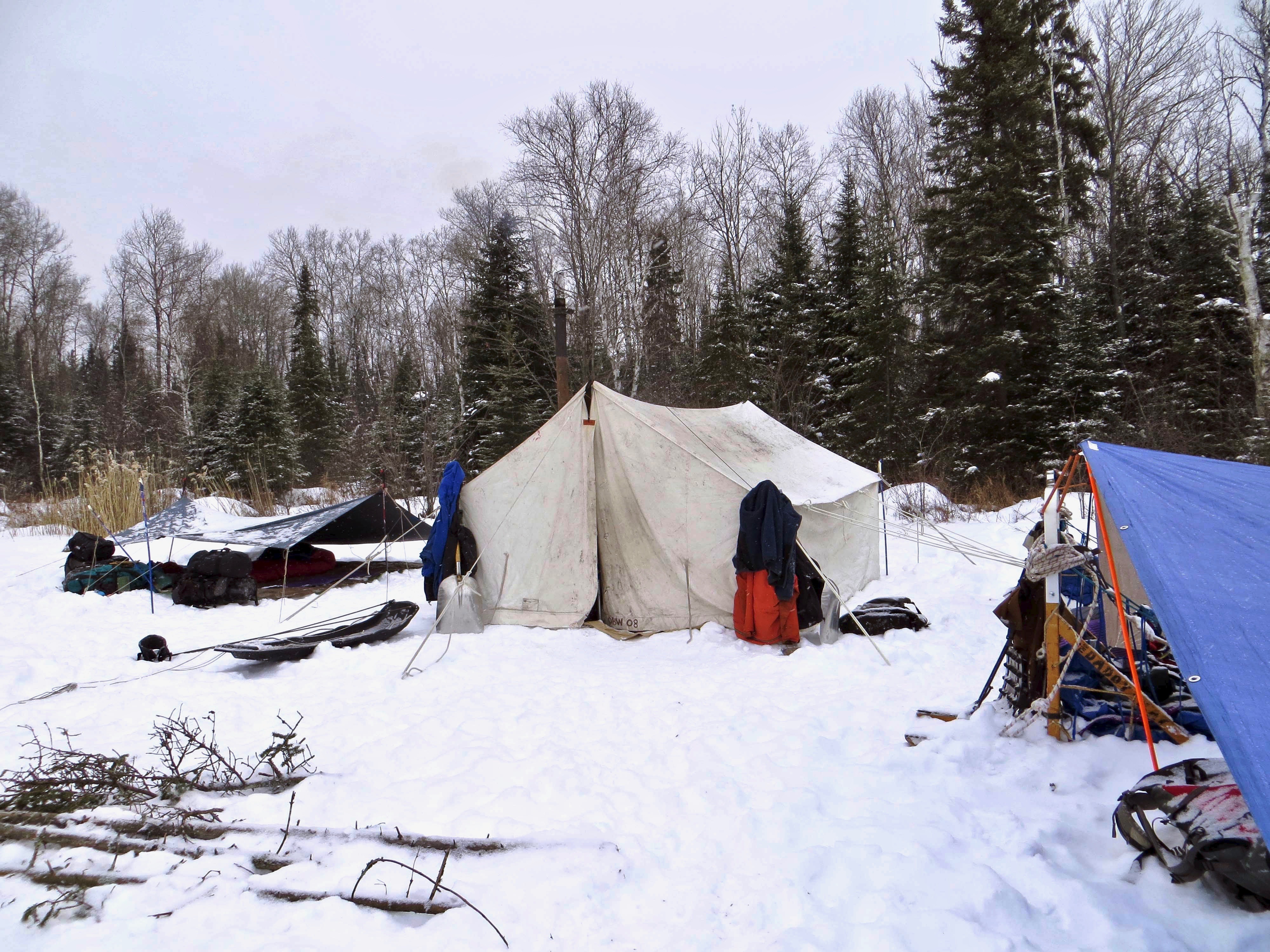
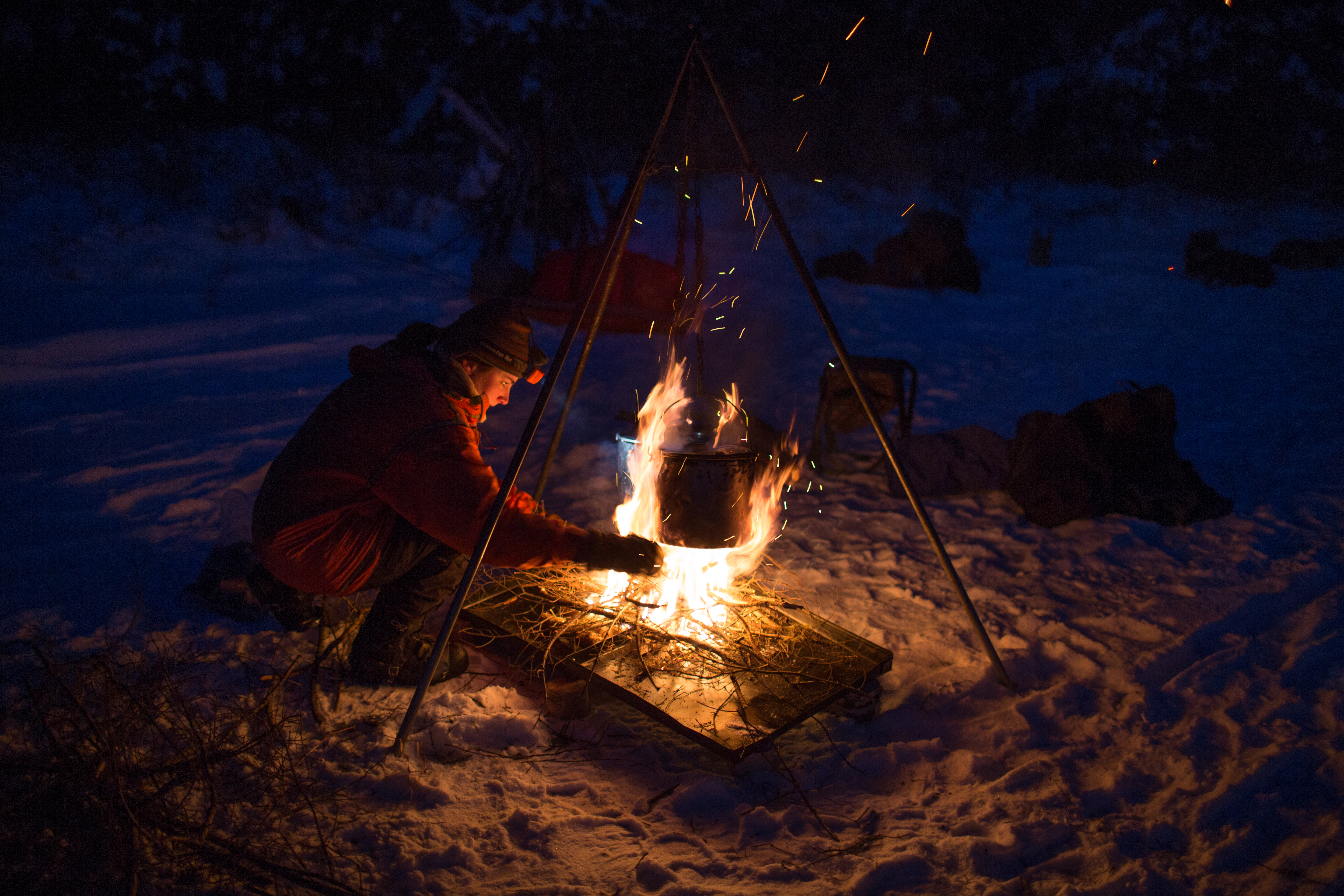
Winter camping doesn't require a tent. Instead, you'll sleep under tarps. The tarp provides protection from snowfall and wind. Underneath you will be a ground sheet and an insolite pad. You'll sleep in a double-sleeping bag system with an inner 20-degree down bag and an outer 0-degree synthetic bag.
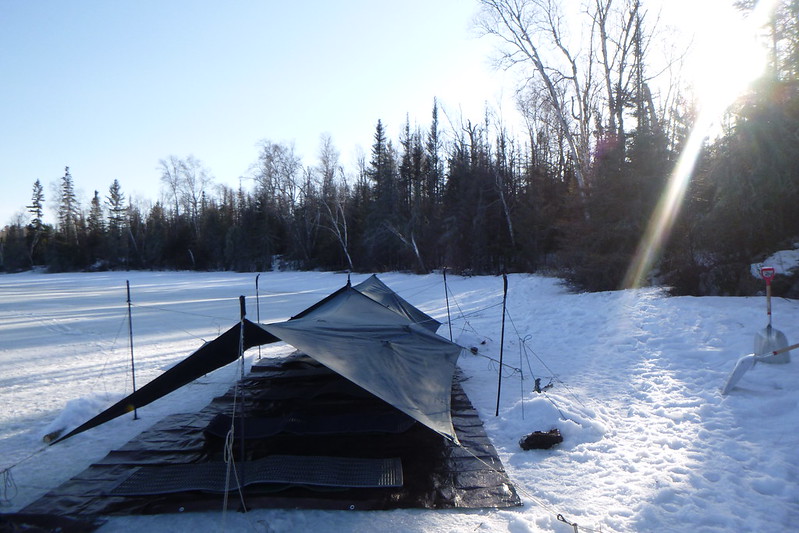
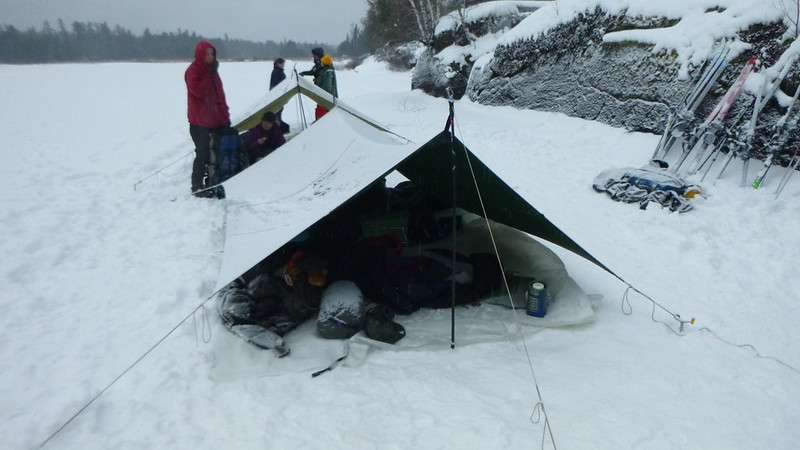
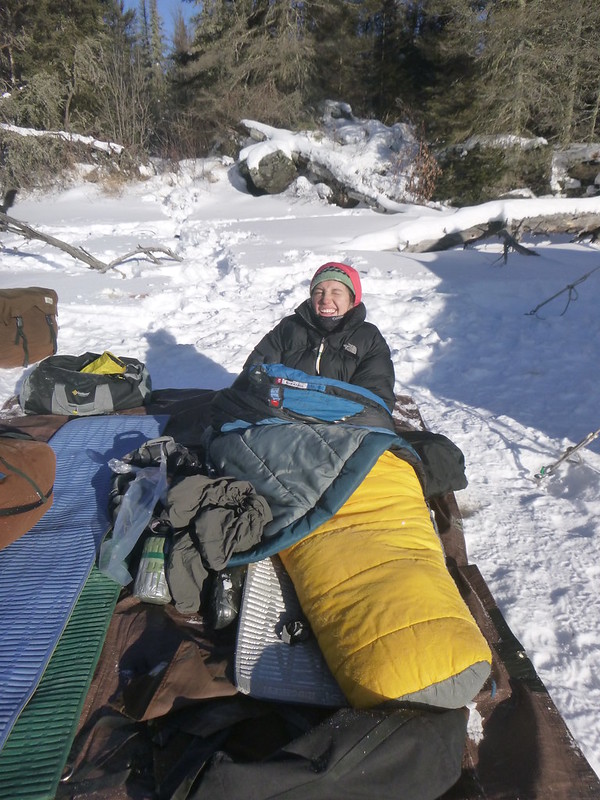
WINTER: Preparing and eating tasty meals in the backcountry is part of the Outward Bound experience.
Under your instructors' supervision, you and your crew will prepare group meals in a camp setting over an open fire. Meals are eaten as a group and may start off with group announcements, appreciations, or an inspirational quote. We use this time together to reflect on the successes and challenges of the day and to plan what is to come for the following day.
Your group will travel with all the food you need for your expedition. For some longer courses, our support staff meet up with your group in the wilderness to restock your food. This meet up is called a “re-supply.”
Our courses are physically rigorous, and our meals emphasize protein and carbohydrates to re-fuel your body. All course food is packable and non-perishable. We use a mix of dehydrated foods, fresh fruits, and vegetables. Our goal is to provide meals that are familiar. However, we ask that you be open to trying foods that may be new to you.
Participants should not bring their own food or snacks unless authorized to do so by your Course Advisor.
Our Food Pack Out Process
All meals at Outward Bound are cooked outdoors in remote camp settings. We work diligently to provide familiar and tasty foods, and we acknowledge that our food options are limited while we are on expedition, away from our supply facilities.
We depend on clear and accurate food allergy and dietary restrictions disclosed during the admission process to adequately plan and pack your group’s meals and snacks before your course start. Our processes are not designed to accommodate last minute dietary requests or to loosen dietary restrictions originally disclosed.
Dietary Restriction Options
- We can accommodate vegetarian, vegan, gluten-free, soy-free, nut-free, and various other dietary restrictions
- Soy Milk (Oat milk for those with soy allergies)
- Sunflower butter and nut-free trail mix for those with nut allergies
- Beans and hummus for vegetarians and dairy-free/vegan options
- Gluten-free noodles and oats (all our granola is gluten-free)
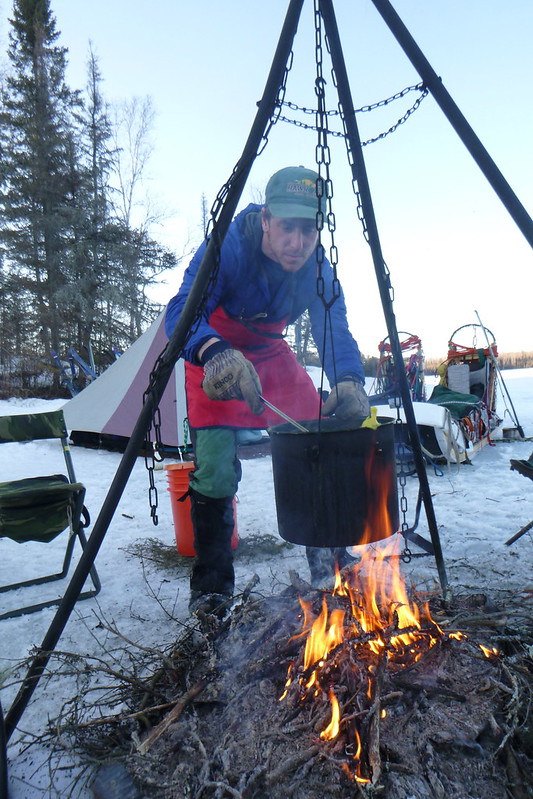
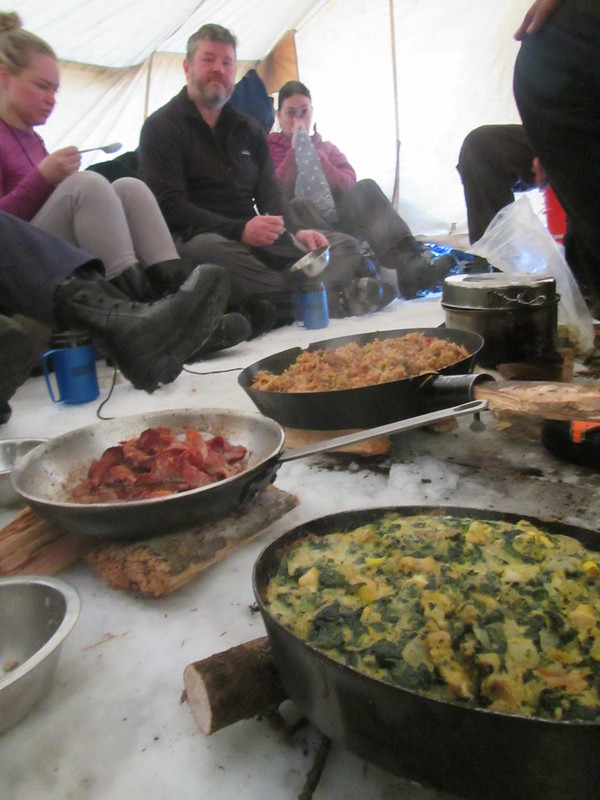
MEALS AT OUTWARD BOUND
The following list represents common meals on winter courses at Voyageur Outward Bound (this is not a menu)
Breakfasts
First Breakfast
- English muffin or bagel with sausage or bacon (veggie sausages, bean burgers, and TVP (soy-protein) patties for vegetarian/vegans)
Second Breakfast
- Breakfast bar of granola, grapenuts, oatmeal, etc. with warm water
- Granola (locally made in Ely, MN) with milk (powder)
- Oatmeal with fixins’ (raisins, pumpkin seeds, cinnamon, sugar)
- Cheesy Grits
- Grape Nuts cereal with Milk (optional: add honey or vanilla pudding powder)
- Eggs and Hashbrowns
“Squirrel Bags” (food for the day, kept with you so you can eat as you go through the day)
- Meat, cheese, dried fruit, nuts
- Meal replacement bars (house-made, three kinds: flappers (oat-based bar with raisins), “nina bars” (granola base with chocolate and peanuts), and peanut bars (peanut butter base with chocolate chips)
Cracker O’Clock - snack boost when you get to camp
Dinners
- Wild Rice Soup
- Spaghetti with Meat Sauce (ground hamburger)
- Pasta Carbonara - Alfredo Sauce with fresh eggs, peas, bacon
- Curry with Chicken or Tofu
Drinks
- Tea (both bags and house-made chai mix)
- Cocoa
- Coffee
- Drink Mixes (Lemon-Lime and Orange)
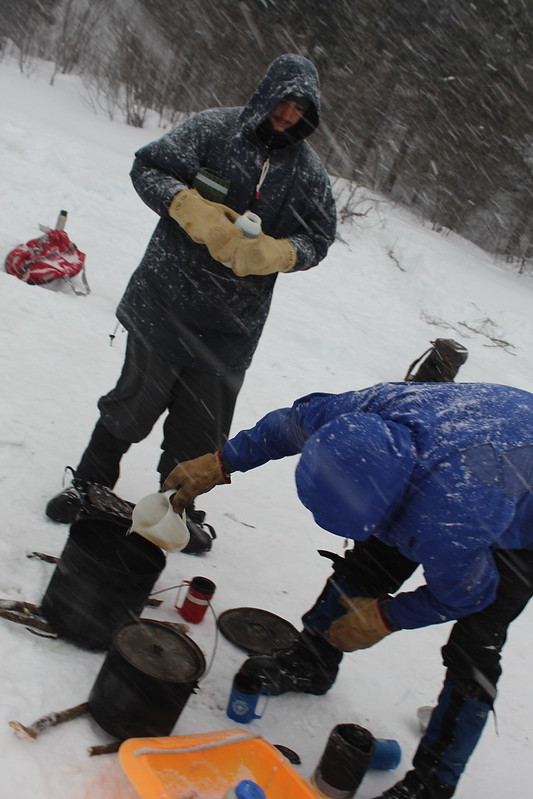
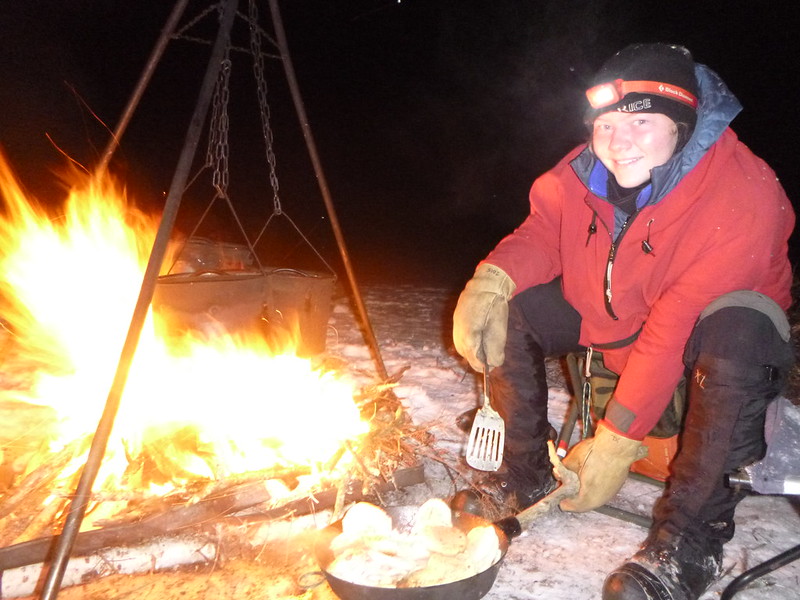
Maintaining personal hygiene in the wilderness is important and is taught on every course. You will be outside while on course and won't have access to a shower or bath. You will be able to do basic cleanup every day: brush your teeth, wash your face and comb your hair. At the end of your course, you will be able to do a more thorough cleanup.
As the Voyageur Outward Bound School is an outdoor program, you can expect to learn and use Leave No Trace camping techniques. Know that it is natural to have questions regarding sanitation in an outdoor setting. Your instructors will answer your questions and will teach you the hygienic and environmentally safe way to dispose of waste as well as techniques for basic cleanliness - don't hesitate to approach them with any questions or concerns.
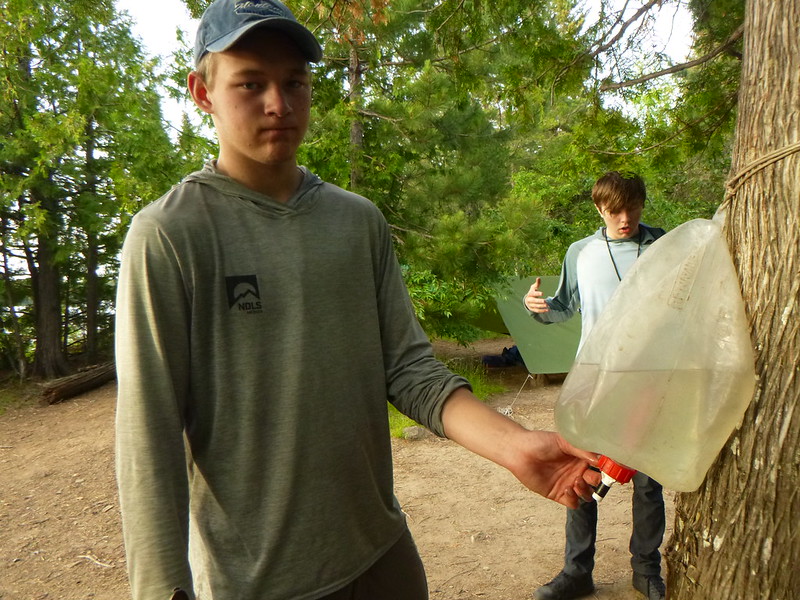
Here are some books that we encourage you to read as you plan for your course:
- The Outward Bound Wilderness First-Aid Handbook by Jeff Isaac
- Leave No Trace: A Practical Guide to the New Wilderness Ethic by Annette McGivney
- Knots & Ropes for Climbers by Duane Raleigh and Mike Clelland
- The Outward Bound Backpacker's Handbook by Glenn Randall
- The Outward Bound Map & Compass Handbook by Glenn Randall
Boundary Waters Canoe Area Wilderness:
- A Boundary Waters History: Canoeing Across Time by Stephen Wilbers
- Magic on the Rocks: Canoe Country Pictographs by Michael Furtman
- Canoe Country Flora: Plants and Trees of the North Woods and Boundary Waters by Mark Stensaas
- Reflections from the North Country by Sigurd Olson
- Talking Sky: Ojibwe Constellations as a Reflection of Life on the Land by Carl Gawboy
- Talking Rocks: Geology and 10.000 Years of Native American Tradition in the Lake Superior Region by Carl Gawboy
- Root Beer Lady: The Story of Dorothy Molter by Bob Cary
Winter Dogsledding courses:
- Cold Nights, Fast Trails: Reflections of a Modern Dog Musher by Dave Olesen
- Winterdance: The Fine Madness of Running the Iditarod by Gary Paulsen
Website Resources:
Piragis Northwoods Company: BWCAW Resouces and books
To participate in a Voyageur Outward Bound School course, each applicant must meet theVoyageur Outward Bound School Essential Eligibility Criteria.
During the enrollment process, everyone is required to each applicant submit all requested medical information, the signed liability release form and if applicable, be interviewed by a student services representative. You will receive these forms, along with any additional forms that may be required of you, via email. Refer to your Registration Email for all your paperwork information, including DUE DATES.
Wilderness travel means you can and, for your comfort, should carry a lot less than you do in the regular world. Most experienced wilderness travelers will tell you they bring about the same amount of gear on a three-day trip as they would on a three-week trip. This packing list has been refined over 50 years of Voyageur Outward Bound School expeditions and is designed to be informative and describe not only what you need to bring, but also what Outward Bound will provide & how it will be used. To view the packing list consecutively click on the 'Print tab' to either download to your files or print a hard copy. Please stick closely to the packing list. It is designed to ensure that you have everything you need to be safe and comfortable during your expedition.
Because our courses are characterized by unpredictable weather, obtaining the proper clothing is crucial. Please bring all the items as described on the "Required Clothing and Gear" list below. We have shared links for some items to show you examples. You also find required clothing & gear items at camping, outdoor/ farm stores, Army/Navy surplus, and thrift stores. Clothing and gear can be expensive—shop around before you buy and keep these helpful tips in mind:
- Start at the thrift store.
- Buy last year’s model.
- Don’t worry about colors or style.
Your choices should be governed by whether or not the piece of clothing or gear will meet our requirements, not if it is the best looking or newest! Consider leaving the tags on any new items you have purchased and saving the receipts; in the event that an item is not needed for your expedition or you do not use it, you should be able to return it when you get back home.
NOTE: When you arrive for course start, you will not have an opportunity to purchase forgotten items.
If you are looking to shop online, many students use the following websites to find their clothing and gear:
On the first night of the course, your instructors will issue you the equipment provided by Outward Bound and assess all of the clothing/equipment you’ve brought in order to ensure that it meets the requirements of the expedition. You’ll repack exactly what you need into packs provided by Outward Bound. Everything you don’t need during the expedition, including your shower supplies, clean clothes for the trip home, valuables, and electronics will stay in your luggage and be stored in a secure location for the duration of the course. These items will be returned to you at the end of the trip.
Outward Bound will provide you with the following items:
- Inner and outer sleeping bags
- Sleeping mat
- Backpack
- Down Parka
- Anorak and outer-layer pants
- Winter boots
- Wool mitten inserts and outer leather choppers
- All group camping, cooking, and traveling equipment
You only need to bring the items listed in the "Required Clothing & Gear" section, mainly your personal clothing, toiletries, footwear, and a few additional items. We strongly discourage the use of personal camping equipment on Voyageur Outward Bound School courses because of the heavy wear and tear. We feel confident that the equipment we provide will best serve your needs on the expedition; it will keep you safe, warm and dry. If you have questions about using a piece of personal equipment normally provided by Outward Bound, please contact your course advisor to discuss.
If you do decide to bring a piece of personal equipment, your instructors reserve the right to inspect it and ensure that it will adequately serve your needs during the expedition. If they do not think it will work, you can leave it with your luggage at the basecamp during the expedition.
Our packing list is based on layering principles; dressing in several light layers rather than one heavy layer allows you more flexibility as the weather and your exertion levels change. When shopping or packing, it is a good idea to try on all of your layers at once to ensure that they fit over one another. Read the information below to get a better idea of what we’re talking about.
- Inner Layer: This is usually called the wicking layer (long underwear, liner socks, and sometimes gloves) – Moisture is the enemy of warmth. Sweat from physical activity like backpacking, paddling, or climbing is your body’s attempt to cool itself off. Synthetic long underwear pulls moisture away from your body, so your sweat won’t cool you down too much and make you cold. This layer is worn next to your skin. Cotton items retain moisture and exaggerate sweat’s cooling effect, which is why we’ll sometimes ask you to avoid using cotton clothing.
- Middle Layer: This is usually called the insulation layer (fleece tops, wool socks, and sometimes fleece pants) – This layer should be thick and fluffy like a fleece or wool sweater that will trap and store the heat your body is producing. This layer is worn over the top of the base layer. Your packing list might require more than one “insulating layer” like a medium weight fleece and a heavier wool sweater. You can put on several "insulating layer" pieces at a time, so be sure to try them on over the top of your inner layer and over the top of each other to ensure you still have mobility and things aren't too tight.
- Outer Layer: This is usually called the wind/shell layer (jackets, pants, and rain gear) – Adding an outer windproof layer prevents the wind from stealing your store of built-up heat. The third layer is worn on top of the base and insulation layers. This layer will take the most wear and tear and look the most weather-beaten by the end of the trip. For dogsledding courses, we provide all outer layers for you. For all other courses, rain gear is provided.
Head & Hands
- 2 Warm Beanies. No cotton. Must cover ears.
- 1 Sun Hat. Baseball cap or wide-brimmed sun hat.
- 1 Neck Gaiter. Important for keeping all the warmth between your head and torso.
- 3 Pairs Light Liner Gloves. Thin, lightweight, synthetic or wool gloves you will wear under bigger mittens. These will likely get destroyed by the end of the trip so when in doubt, opt for less expensive options. See example here: Light Liner Gloves
- 2 Pairs Heavy Liner Gloves. Thicker synthetic or wool gloves to wear under bigger mittens. See example here: Heavy Liner Gloves
- 1 Buff. Versatile lightweight neck gaiter. Buff Example
Upper Body
- 2 Light or Medium Weight Long Underwear Tops. This can be fitted (not restrictive) because it will be the base layer next to your skin.
- 1 Medium-Weight Warm Top. This can be a polyester or 100 weight wool or fleece shirt. Usually comes with a ½ to ¾ zipper.
- 1 Heavy Fleece or Wool Top. Must have good breathability and dry quickly when wet. This can usually be found at a thrift store. Must fit over all other layers--try these on together: the long underwear top (inner), medium-weight warm top (middle), and then the heavy fleece or wool (outer).
- 1 Synthetic Puffy Jacket or Fleece Vest. Having a vest or a thin synthetic “puffy” jacket will help to keep you warmer in a variety of conditions. If you buy a synthetic jacket, a hood is recommended. Vests are a less expensive option.
- 2 Sports Bras. Should be appropriate for athletic activity. Many people will use this as a swimsuit top with Quick Dry shorts. You do not need to bring a swimsuit if you plan on using this combination.
Lower Body
- 2 Medium Weight Long Underwear Bottoms. This can be fitted (not restrictive) because it will be the base layer next to your skin.
- 1 Fleece Pants. Should be made out of Polyester Fleece and loose enough to fit over a pair of long underwear or shorts.
- 4 Pairs of Underwear - Quick Drying or Cotton. Quick-drying underwear is usually a blend of Nylon and Spandex that breathes well, wicks moisture, and dries quickly. Quick Drying is recommended, but cotton is okay as well.
- 1 Swimsuit. You may choose to bring a swimsuit or use a pair of shorts and a sports bra for swimwear. You will use this to take a Sauna at the end of your course.
Feet
- 4 Pair Heavyweight Wool Socks. These socks are thicker than the medium weight and most likely will have expedition or mountaineering in the name. Must be wool. See example here: Wool Socks
- 3 Pair Liner Socks. Lightest-weight, synthetic socks to wear under your wool socks. See example here: Liner Socks
Personal Gear
- 2 Bandanas. These will be helpful in multiple different ways and will likely get ruined during your course. Bring old or cheap bandanas that you are not attached to.
- 1 Pair Sunglasses w/ Keeper Strap and Hard Case. Essential for protecting your eyes in a highly reflective environment. A keeper strap is important so they don’t fall into the water and sink.
- 2 Water Bottles. Must be a 32 oz. wide mouth Nalgene-style bottle with a plain lid.
- 1 Small Headlamp with Extra Batteries. This is a hands-free flashlight. It is either an LED or halogen headlamp that uses a minimum of three volts (two or more AA- or AAA-batteries). Halogen bulbs are bright but consume more battery power. LED lamps are bright and consume very little battery power. Bring one extra set of alkaline batteries per week of course.
Toiletries & Other Personal Items
- 1 Sunscreen. Waterproof, SPF 30 or greater. Stick-type sunscreen (Dermatone) works better in the cold.
- 1 Lip Balm. 30+ SPF or greater.
- 2 Hand Sanitizers. Pocket-sized squeeze bottles of hand sanitizer.
- 1 Toiletries Kit. Toothbrush, small toothpaste, comb or brush.
- Feminine Hygiene products. Pack plenty of supplies. Changes in activities can cause irregular periods.
- 2 Sets of Prescription Medications. If you use prescription medications, including inhalers, please bring enough for the entire course. If possible, bring a backup set. If you use an inhaler or have a prescription epi-pen, you must bring two. If you use an albuterol Rescue inhaler please bring a spacer. If you do not currently have one please get one prescribed by your doctor to bring along on the trip. Spacers allow the medicine to get into your lungs faster and play a key role in managing asthma in the backcountry. Clearly label everything with medication names, dosages and when you take them. Instructors administer medications for students 21 and younger and will ask for them upon your arrival so pack medications in an accessible place in your carry-on. Outward Bound should be aware of any medications you are bringing, if not, please contact your Course Advisor immediately.
- Contacts and back-up glasses, if needed. We strongly recommend contacts over glasses for use during the day because glasses will fog up. Bring plenty of supplies and at least one set of backup glasses with a hard case. Because sterile lens care is more difficult on the trail, long-term use contacts are not encouraged. Daily disposable contacts are a good option that will help you avoid dirt and dust build-up that might cause damage to your eyes.
- 1 Medical Insurance Card. Please bring your Insurance card, or a copy of the front and back of the card, if you are covered under any medical insurance. The actual card is preferred.
- 1 Towel and Shower Supplies. You’ll have a chance to sauna and shower after your expedition. Bring whatever shower supplies you normally use, ideally in travel sizes, and a towel (any cotton towel). Pack these items in their own kit so it’s easy to find when you return to basecamp. These items will not go on the expedition with you.
- 1 Pair Flip Flops. One pair of sandals to wear in the shower.
- 2 Sets Clean Clothes. After you return to basecamp and shower you’ll want clean clothes. You’ll wear these around basecamp and traveling home. Be sure to think about warmth and layers when packing and don’t forget to include socks and underwear.
Travel
- Money. Think about bringing $15-$20 for meals for your arrival and departure travel days. Also, bring a little money if you think you’d like to purchase a sweatshirt, t-shirt, map or cap from the Voyageur Outward Bound School store after your course. The school store accepts cash or check only, no credit or debit cards.
- Travel Information. Carry a copy of the Outward Bound Travel Information for your course (on the tab next to this one) with the Outward Bound phone number in case of travel delays. See this information for directions on what to wear to the start of your course.
- Cell Phone and Charger. It’s a good idea to travel with a cell phone in case of travel delays. However, please note that upon arrival you will be asked to turn off and store your phone in your luggage, which will be locked in a secure area while you are on course.
Participants will not be permitted to begin their course without their required medications OR with new medications not approved by your Course Advisor.
All medications (prescription, non-prescription and over-the-counter) must:
- Be listed in the applicant’s medical information
- Be approved by your Course Advisor prior to course
- Accompany the participant on course
- Be in the original medication container with the prescription label intact
Your medication container should not include other medications, vitamins or supplements. If possible, bring a back-up supply.
Do not bring non-prescription medications such as aspirin, Advil, etc., unless they are listed in your medical information. We have a medical kit that contains these medications.
Medication updates that occur after applicants are cleared to participate could affect their status on course. Please update your Course Advisor with any medication changes such as:
- Starting a new medication
- Stopping an existing medication
- Dosage change of an existing medication
For participants on youth courses, our instructors carry all prescription medications, with the exception of birth control and emergency medications such as EpiPens or rescue asthma inhalers.
For participants on adult (age 18+) courses, we encourage participants to store their medication(s) container(s) in a zip-lock bag for protection. Pill sorters are not recommended.
You must notify Outward Bound should any medical, psychological, behavioral, or legal situations occur after the application and medical review process have been completed. Certain situations may affect the applicant’s course status.
Increased physical activity during Outward Bound may cause a change in your menstrual cycle. Prepare your menstruation kit using a zip lock bag even if you don’t expect your cycle during course.
Items to include:
- Menstruation products such as tampons, pads, panty liners, and menstrual cups. Bring more than you would typically use. Absorption underwear is not recommended. For a water-based course, we recommend avoiding pads for day-use if possible.
- 1 small travel pack of septic-friendly disposable wipes or bandana. Our instructors will teach appropriate backcountry techniques for basic cleanliness.
- 1 small travel-size bottle of hand sanitizer
- 1 to 2 extra pairs of underwear
We practice Leave No Trace camping techniques. Therefore, we pack out what we pack in. Instructors will distribute small opaque zip lock bags and small stuff sack for your individual storage of used items.You will dispose of any used items either during re-supplies (approximately every three to seven days) or at course end.
Your instructors are experienced in addressing menstruation care questions or concerns while on course. Don’t hesitate to ask them questions.
PERSONAL HYGIENE:
Maintaining personal hygiene in the wilderness is important and is taught on every course. You will be outside while on course and won't have access to a shower or bath. You will be able to do basic cleanup every day: brush your teeth, wash your face, and comb your hair. At the end of your course, you will be able to do a more thorough cleanup.
PRESCRIPTION EYEWEAR: GLASSES & CONTACTS
Please bring your prescription eyewear and any applicable backup options. For glasses, a glasses leash is helpful to prevent loss during an activity.
For participants who wear contact lenses, you must bring your prescription glasses as backup. Be sure to bring enough contact lens solution so you can be diligent in your contact lens routine while out on expedition.
Please be aware that the use of contact lenses in the backcountry does carry more risk than when at home. A great level of diligence and hygiene is required to ensure you do not damage your eyes.
SKIN CARE
You will be outside during your course. To maintain your health and comfort, the best protection from biting insects, skin irritation, and sunburn is a physical barrier of clothing. Bring the required clothing and gear listed – it's essential to your comfort and safety.
Living outside and exposing your skin to the elements can lead to dry skin. If you have a cream you use to care for dry skin or other related skin-health, consider bringing any creams or prescription creams you've found useful. Be sure to ask your course advisor any questions you might have.
It is your responsibility to follow your instructor’s directions and monitor how your skin reacts to the changing environment. Let them know if you encounter skin concerns before they present a barrier to your participation.
As you pack your toiletries, if you're traveling by air to your course, please review the TSA Carry-on Requirements for liquids.
HAIR CARE
Here are a few tips caring for long, kinky, or curly hair while on course:
- Bring a comb, brush, or pick
- Protect your hair by covering it with a hair bonnet, silk scarf, headwrap, durag, loc tube, bandana, etc.
- Use a bandana, head wrap, hair scrunchies, etc., to keep hair out of your face
- Bring 3oz hair oil
Before course, consider putting your hair in a protective style, allowing enough time for your head to adjust prior to the start of your Outward Bound course. Be sure that your protective style will fit underneath a helmet. Suggested protective styles include:
- Box Braids
- French Braids
- Feed-in Braids
- Cornrows
- Faux Locs
- Two Strand Twists
- Plaits
- Flat Twists
None of these items are required and you will be fine without them. Please only buy them if you plan to use them again after your course or you think they will be of great assistance to you during the course. You may be asked to leave these items behind depending on pack-size and weight restrictions.
- Fleece Shorts or Down Skirt. While this item is optional, we HIGHLY recommend it for any courses in January and February. This extra layer helps protect your butt, thighs, and other sensitive areas against wind and cold. It should be sized to fit over two layers of base-layer pants.
- 1 Pair Down/Dacron Booties. Also optional but those who bring them are always VERY happy to have them. Nice to wear in and around your sleeping bag at night. Booties with sturdy soles are best.
- 1 Camera. Waterproof disposables (bring a few) are great and you don’t have to worry about protecting them from the elements. A small regular camera is great, but you’ll need to take extra precautions to protect it. For digital cameras, we ask that the memory card(s) be blank; please back up your photos and erase your memory cards prior to arriving for course.
- 1 Small Journal. Small and sturdy. Please bring pens and put in a Ziplock bag.
- 1 Hand Lotion. Travel-size bottle. Dry weather can be hard on your skin.
- 1 Thermos. 1 liter or smaller stainless steel thermos. Must be well insulated, not a thin single wall.
- Ear Plugs. For sleeping.
- Digital Watch. Basic digital watch with an alarm. DO NOT bring any fitbits, apple watches, or other electronic watches equipped with GPS or messaging capabilities.
i-pods, MP3 players, computers, i-pads, and GPS devices?
Cell phones, tablets, GPS devices and all other electronic devices (exception-digital cameras) are not permitted on course. Electronic devices can be distracting and disruptive to the wilderness experience. Stepping away from these devices encourages participants to focus on their experience and their crewmates.
You are, however, more than welcome to travel to and from your course with whatever technology you choose. When you arrive, we’ll have you turn off all electronic devices and leave them in your luggage. Your luggage will then be locked in a secure area during your course. At the end of your course, you’ll get everything back. Additionally, please do not bring any emergency response technology. Your instructors will carry emergency communication devices.
cameras?
Cameras are welcomed at Voyageur Outward Bound School. We recommended waterproof disposable cameras. If you elect to bring a non-disposable camera, we advise that you store it in a small “dry bag” or plastic zip-lock bag. Our courses are rigorous and there is a risk of losing or damaging your camera.
For digital cameras, we ask that the memory card(s) be blank; please back up your photos and erase your memory cards prior to arriving for course. Cell phone cameras, tablets, and any other Wi-Fi enabled electronic devices with built-in cameras are not permitted on the course.
my cell phone and use it as a camera?
No, if you’d like to take pictures, please bring a camera that does not have cellular capabilities. No cell-phones will be allowed on the expedition.
a book?
Unless it’s a natural history identification book, we’d ask you to leave books at home. You’ll be very busy during your expedition and will want to spend your downtime with other group members, sleeping, and just relaxing in nature. Books also get damaged easily. You can bring a book for your travel days but don’t plan to bring it on the expedition.
a pocket knife?
Please do not bring any knives with you to your course-start. Your instructors will provide knives as they are needed throughout the expedition.
my own camping gear (sleeping bag, tent, etc.)?
We strongly discourage the use of personal camping equipment on Voyageur Outward Bound School courses because of the heavy wear and tear. We feel confident that the equipment we provide will best serve your needs on the expedition; it will keep you safe, warm and dry. If you have questions about using a piece of personal equipment normally provided by Outward Bound, please contact your course advisor to discuss. If you do decide to bring a piece of personal equipment, your instructors reserve the right to inspect it and ensure that it will adequately serve your needs during the expedition. If they do not think it will work, you can leave it with your luggage at the basecamp during the expedition.
over the counter medications?
Voyageur Outward Bound School Instructors carry an extensive First-Aid kit with ample supply of over-the-counter medications like pain relievers and antacids, among other supplies. Instructors also carry prescription epinephrine injections in case of an anaphylactic emergency. You shouldn’t need to bring your own OTC medication. However, if you frequently take something specific, please consult your course advisor to discuss whether you should bring it or not.
tobacco, drugs, or alcohol?
Tobacco, drugs, and alcohol are NOT permitted on course, this includes both time spent in the wilderness and at basecamp.
Please also DO NOT bring valuables, jewelry, makeup, candy, gum, or large amounts of money.
Head & Hands
- 2 Warm Beanies. No cotton. Must cover ears.
- 1 Sun Hat. Baseball cap or wide-brimmed sun hat.
- 1 Neck Gaiter. Important for keeping all the warmth between your head and torso.
- 3 Pairs Light Liner Gloves. Thin, lightweight, synthetic or wool gloves you will wear under bigger mittens. These will likely get destroyed by the end of the trip so when in doubt, opt for less expensive options. See example here: Light Liner Gloves
- 2 Pairs Heavy Liner Gloves. Thicker synthetic or wool gloves to wear under bigger mittens. See example here: Heavy Liner Gloves
- 1 Buff. Versatile lightweight neck gaiter. Buff Example
Upper Body
- 2 Light or Medium Weight Long Underwear Tops. This can be fitted (not restrictive) because it will be the base layer next to your skin.
- 1 Medium-Weight Warm Top. This can be a polyester or 100 weight wool or fleece shirt. Usually comes with a ½ to ¾ zipper.
- 1 Heavy Fleece or Wool Top. Must have good breathability and dry quickly when wet. This can usually be found at a thrift store. Must fit over all other layers--try these on together: the long underwear top (inner), medium-weight warm top (middle), and then the heavy fleece or wool (outer).
- 1 Synthetic Puffy Jacket or Fleece Vest. Having a vest or a thin synthetic “puffy” jacket will help to keep you warmer in a variety of conditions. If you buy a synthetic jacket, a hood is recommended. Vests are a less expensive option.
- 2 Sports Bras. Should be appropriate for athletic activity. Many people will use this as a swimsuit top with Quick Dry shorts. You do not need to bring a swimsuit if you plan on using this combination.
Lower Body
- 2 Medium Weight Long Underwear Bottoms. This can be fitted (not restrictive) because it will be the base layer next to your skin.
- 1 Fleece Pants. Should be made out of Polyester Fleece and loose enough to fit over a pair of long underwear or shorts.
- 4 Pairs of Underwear - Quick Drying or Cotton. Quick-drying underwear is usually a blend of Nylon and Spandex that breathes well, wicks moisture, and dries quickly. Quick Drying is recommended, but cotton is okay as well.
- 1 Swimsuit. You may choose to bring a swimsuit or use a pair of shorts and a sports bra for swimwear. You will use this to take a Sauna at the end of your course.
Feet
- 4 Pair Heavyweight Wool Socks. These socks are thicker than the medium weight and most likely will have expedition or mountaineering in the name. Must be wool. See example here: Wool Socks
- 3 Pair Liner Socks. Lightest-weight, synthetic socks to wear under your wool socks. See example here: Liner Socks
Personal Gear
- 2 Bandanas. These will be helpful in multiple different ways and will likely get ruined during your course. Bring old or cheap bandanas that you are not attached to.
- 1 Pair Sunglasses w/ Keeper Strap and Hard Case. Essential for protecting your eyes in a highly reflective environment. A keeper strap is important so they don’t fall into the water and sink.
- 2 Water Bottles. Must be a 32 oz. wide mouth Nalgene-style bottle with a plain lid.
- 1 Small Headlamp with Extra Batteries. This is a hands-free flashlight. It is either an LED or halogen headlamp that uses a minimum of three volts (two or more AA- or AAA-batteries). Halogen bulbs are bright but consume more battery power. LED lamps are bright and consume very little battery power. Bring one extra set of alkaline batteries per week of course.
Toiletries & Other Personal Items
- 1 Sunscreen. Waterproof, SPF 30 or greater. Stick-type sunscreen (Dermatone) works better in the cold.
- 1 Lip Balm. 30+ SPF or greater.
- 2 Hand Sanitizers. Pocket-sized squeeze bottles of hand sanitizer.
- 1 Toiletries Kit. Toothbrush, small toothpaste, comb or brush.
- Feminine Hygiene products. Pack plenty of supplies. Changes in activities can cause irregular periods.
- 2 Sets of Prescription Medications. If you use prescription medications, including inhalers, please bring enough for the entire course. If possible, bring a backup set. If you use an inhaler or have a prescription epi-pen, you must bring two. If you use an albuterol Rescue inhaler please bring a spacer. If you do not currently have one please get one prescribed by your doctor to bring along on the trip. Spacers allow the medicine to get into your lungs faster and play a key role in managing asthma in the backcountry. Clearly label everything with medication names, dosages and when you take them. Instructors administer medications for students 21 and younger and will ask for them upon your arrival so pack medications in an accessible place in your carry-on. Outward Bound should be aware of any medications you are bringing, if not, please contact your Course Advisor immediately.
- Contacts and back-up glasses, if needed. We strongly recommend contacts over glasses for use during the day because glasses will fog up. Bring plenty of supplies and at least one set of backup glasses with a hard case. Because sterile lens care is more difficult on the trail, long-term use contacts are not encouraged. Daily disposable contacts are a good option that will help you avoid dirt and dust build-up that might cause damage to your eyes.
- 1 Medical Insurance Card. Please bring your Insurance card, or a copy of the front and back of the card, if you are covered under any medical insurance. The actual card is preferred.
- 1 Towel and Shower Supplies. You’ll have a chance to sauna and shower after your expedition. Bring whatever shower supplies you normally use, ideally in travel sizes, and a towel (any cotton towel). Pack these items in their own kit so it’s easy to find when you return to basecamp. These items will not go on the expedition with you.
- 1 Pair Flip Flops. One pair of sandals to wear in the shower.
- 2 Sets Clean Clothes. After you return to basecamp and shower you’ll want clean clothes. You’ll wear these around basecamp and traveling home. Be sure to think about warmth and layers when packing and don’t forget to include socks and underwear.
Travel
- Money. Think about bringing $15-$20 for meals for your arrival and departure travel days. Also, bring a little money if you think you’d like to purchase a sweatshirt, t-shirt, map or cap from the Voyageur Outward Bound School store after your course. The school store accepts cash or check only, no credit or debit cards.
- Travel Information. Carry a copy of the Outward Bound Travel Information for your course (on the tab next to this one) with the Outward Bound phone number in case of travel delays. See this information for directions on what to wear to the start of your course.
- Cell Phone and Charger. It’s a good idea to travel with a cell phone in case of travel delays. However, please note that upon arrival you will be asked to turn off and store your phone in your luggage, which will be locked in a secure area while you are on course.
Optional Items
- Fleece Shorts or Down Skirt. While this item is optional, we HIGHLY recommend it for any courses in January and February. This extra layer helps protect your butt, thighs, and other sensitive areas against wind and cold. It should be sized to fit over two layers of base-layer pants.
- 1 Pair Down/Dacron Booties. Also optional but those who bring them are always VERY happy to have them. Nice to wear in and around your sleeping bag at night. Booties with sturdy soles are best.
- 1 Camera. Waterproof disposables (bring a few) are great and you don’t have to worry about protecting them from the elements. A small regular camera is great, but you’ll need to take extra precautions to protect it. For digital cameras, we ask that the memory card(s) be blank; please back up your photos and erase your memory cards prior to arriving for course.
- 1 Small Journal. Small and sturdy. Please bring pens and put in a Ziplock bag.
- 1 Hand Lotion. Travel-size bottle. Dry weather can be hard on your skin.
- 1 Thermos. 1 liter or smaller stainless steel thermos. Must be well insulated, not a thin single wall.
- Ear Plugs. For sleeping.
- Digital Watch. Basic digital watch with an alarm. DO NOT bring any fitbits, apple watches, or other electronic watches equipped with GPS or messaging capabilities.
Arrival Time and Location
Location: Duluth International Airport.
VOBS staff will meet students in the baggage claim area. The Duluth airport is very small; our staff will be easy to find.
Arrival Time: No later than 1:00 PM. (Please try to arrive before this time as we hope to depart from the airport by this time.)
- For drop-offs: Please plan to arrive between 10:30-11:30 AM. This will help us check you in and avoid a rush right at 1:00 PM. If you plan to leave a car at the airport during drop-off or during your course, short and long-term parking are available in a secure pay lot.
- For flights: If you are unable to find a flight arriving in Duluth by 1:00 PM on your course start day, you will need to arrive the night before and stay in Duluth. Please see the Pre & Post Course Accommodations Tab for information about hotels in Duluth. If you arrive the night before, arrange to return to the airport between 10:30-11:30 AM on your course start day.
- For shuttle service: Shuttle services are available between the Minneapolis/St. Paul Airport (MSP) and Duluth, which may be a good option for some travel plans. Services available include Landline Shuttle Services and Groome Transportation. If you are taking a shuttle, it must be booked in advance. Groome will pick you up at the MSP airport. Select your drop-off destination as the Duluth International Airport or the Groome Main Office in Duluth, MN
Additional Important Arrival Day Information:
- Recently, we have found that there are fewer flight options overall, and far fewer connecting flights into Duluth, MN. Many families have had a more positive and stress-free travel experience if they arrive the day before the course, spend the night in Duluth, and meet the group at the airport the next day. While not required, this can be a nice option to consider as you make your travel plans.
- Please eat lunch before meeting at the Airport. Also, plan to make any final phone calls before arriving at the airport. Expect to be at the airport until your whole group has arrived, at which time we will transport you an additional 2-3 hours to your course-start location.
- CLOTHING/DRESS ON ARRIVAL DAY – Please arrive at the meeting place already dressed in your expedition clothes. Boots or tennis shoes, wool socks, quick-dry pants, underwear, t-shirt, and an accessible warmer, long-sleeved layer work best on the first day. Please see the Packing List tab for further information about appropriate luggage, clothing and layering principles.
Travel Delays or Late Arrivals
If you experience delays or cancellations on arrival day, please contact our Travel Coordinator at: (218) 491-6799.
With so many people traveling on the same day, we anticipate some hiccups. If your arrival is delayed, don’t worry too much. Contact our Travel Coordinator and we will do our best to coordinate an alternative plan with you.
Students will be transported back to Duluth, Minnesota at the end of their course.
- For pick-ups, plan to meet your student at the Duluth International Airport at 11:00 AM.
- For departures via flight, please do not book a flight departing before 11:00 AM from the Duluth International Airport. If you're having difficulty finding a departing flight after 11 AM, please speak with your course advisor and we'll work to accommodate your request.
- For departures via Groome, VOBS will transport you to the Groome Transportation Office drop-off location (214 N 34th Ave West, Duluth, MN 55807) after stopping at the Duluth Airport.
- For other departure options, please schedule transport from the Duluth Airport to your destination.
- IMPORTANT NOTE: if a student tests positive for COVID-19 on their course, an alternate travel plan will need to be made.
If you have any questions, please speak with your Course Advisor.
MEALS AND MONEY ON ARRIVAL/DEPARTURE DAYS - Please bring a little cash for meals during your travel days. Outward Bound will provide dinner on the first day, breakfast on the last day, and some snacks on both of these days. There are minimal food options once you exit the security gate at the airport so plan to get something before you arrive or before you exit security. Remember to drink plenty of water throughout travel days!
MEDICATIONS – If you take a prescription medication, please ensure that you have enough to complete the entire course, and bring a back-up set if possible. If you use an inhaler or carry an Epi-pen, please bring 2 sets.
Remember to pack your medications and other important items (contacts, glasses, travel documents, money) in your carry-on luggage in case your checked bag is delayed or lost.
CLOTHING/DRESS ON ARRIVAL DAY – Please arrive at the meeting place dressed in warm layers suitable to below zero temperatures. Boots or tennis shoes, wool socks, long-underwear, and comfortable/warm outer layers work best on the first day. Please see the provided packing list for further information about appropriate luggage, clothing and layering principles.
If you are unable to arrive by 1:00 PM on the first day of the course, we advise that you arrive a day early. There are multiple hotel options in Duluth near the airport. Hotels may or may not offer a shuttle to the airport. If not, students can take an Uber between the airport and the hotel.
Days Inn and Suites. Can accommodate 18+ students, no minors. Students must have credit card in hand when they arrive to complete the payment.
909 Cottonwood Ave. Duluth, MN
218-727-3110 - Call this direct line to make reservations. If you are staying between November and May they will offer a special VOBS rate.
Country Inn & Suites by Radisson, Duluth North near Airport:
Can accommodate minors with parent authorization. Call the hotel; you will likely need to speak with the manager.
218-461-3312; 4257 Haines Road, Duluth, MN
AmericInn by Wyndam Duluth. Can accommodate minors with parents' authorization.
901 Joshua Ave. Duluth, MN; 218-723-8607 - Call to make reservations. A VOBS discount may be available depending on the time of year.
If you are over 21 years old, there are many other hotels near the Duluth airport that are available to you.
Please familiarize yourself with the policies outlined in the Policies Page. By enrolling in Outward Bound you are accountable for and subject to the information contained on these pages.
If a student’s family experiences an emergency and needs to contact them while they're on course, the family should use the emergency response number at 218-491-6799 and listen to the voicemail message for instructions. Each student has a designated course director. The course director's contact information is emailed to families of youth courses on Day 1 of the course. The course director becomes the primary contact during the course; however, they may be out in wilderness and not immediately available.
In our everyday lives, technology is always at our fingertips. By contrast, in the life of an Outward Bound participant, you have the unique opportunity to unplug and fully immerse yourself in the wilderness to connect with your crewmates and instructors.
Guidelines
NO:
- Electronic devices such as cell phones, GPS devices, asset tracking devices (such as Airtags), and/or any other wi-fi enabled electronic devices are not permitted while on course.
- No cell phone cameras allowed.
YES:
- Carry your cell phone with you to course start. Your cell will be locked in a group storage bin with your luggage at our facility while you are on course. You’ll be reunited with your cell phone at course end.
- Bring a camera to record the events of course – either a waterproof disposable camera or a digital camera with a small “dry bag” or Ziplock bag for storage. Our courses are rigorous and there is a risk of losing or damaging your camera.
Please follow this link to read VOBS' Essential Eligibility Criteria.
VOBS regularly evaluates its programming. Students may be asked to complete 1-2 surveys at the end of their course to assist us in this evaluation. These surveys may include:
1. We ask all participants to complete an anonymous survey at the end of programming. Participants are asked to answer the survey items and to indicate their race/ethnicity, gender, and birth year. Completing the survey is optional. No identifying information is included as part of the survey or in any reporting. We also ask participants to provide a reflection of their course and other feedback. This information is used by the organization for reporting on program outcomes and for program improvement purposes.
2. Outward Bound is partnering with The PEAR Institute (Partnerships in Education and Resilience) on a research project to promote our students’ positive social-emotional development. As part of this effort, Outward Bound staff may invite you/your child to complete a brief survey at the end of your/their Outward Bound course. The survey includes PEAR’s Holistic Student Assessment (HSA) plus several additional questions about the student’s social-emotional development and experience while on the course. You/your child’s responses will be kept confidential, results will be reported as a group, and names will never be used in any reports related to this research. Data from this survey will be used for research and educational work and only designated Outward Bound staff and Outward Bound’s research partners will have access to the results.
For more information, including the opportunity to opt-out of the survey, click on the following link/s to download the English Language, English-Spanish Language, or English-CapeVerdeCreole Language versions of the consent form opt-out and return a signed copy to your Course Advisor.
Students on courses that are 14 days or longer can receive mail. Because students are in the wilderness for most of their expedition, mail is not distributed until the last day of the course. If families need to share important information before the last day of the course, they should contact their course director.
Addressing Mail:
Student Name/Course Number
Voyageur Outward Bound School
PO Box 450
Ely, MN 55731
Safety is our number one priority. At all levels of our school, we demonstrate our dedication to participant safety by our words, actions and values. Outward Bound has been a national leader in wilderness safety for over 50 years and frequently advises and assists other organizations in outdoor adventure risk management. Living and traveling in a remote wilderness setting exposes you to risks different than those you may encounter in your daily life. We believe that accepting appropriate risks and training and preparing participants to manage those risks, provides invaluable life experience.
Regardless of precautionary measures, risk and uncertainty are central to the concept of challenge and adventure. The intent is not to avoid activities involving risk but to recognize, prepare for and successfully manage risk. In order to identify any potential hazards and update best practices, our programs are regularly reviewed by outdoor professionals from inside and outside the Outward Bound system.
Outward Bound instructors receive regular training in the activities and environments in which we deliver our courses. They are trained to anticipate and manage risks inherent in remote areas. They are also trained in first aid, search and rescue and emergency management. Our instructors are certified Wilderness First Responders; some are Wilderness Emergency Medical Technicians or equivalent. Outward Bound maintains a minimum staff-to-student ratio of approximately 1:6. Instructors work in teams of two or three with six to 12 students. Instructor teams are usually co-ed but balancing skills and teaching styles is our primary staffing focus. One instructor in every team is a lead instructor with multiple seasons of training and experience. The lead instructor has single point accountability for the safety and effectiveness of the course in the field as well as mentoring their staffing team.
For more information on our instructors, please check out our staff profiles page or our careers page for instructor requirements. As a participant, you must take responsibility for yourself by following instructions and practicing the skills taught by your instructors.
Sign Up for Updates
Please fill out the form below to begin receiving our email newsletter.

- +1 (218) 491-6801
-
Admissions
+ 1 (828) 239 2376 - Email us - student.services@vobs.org
-
1650 Carroll Ave.
St. Paul, MN 55104
